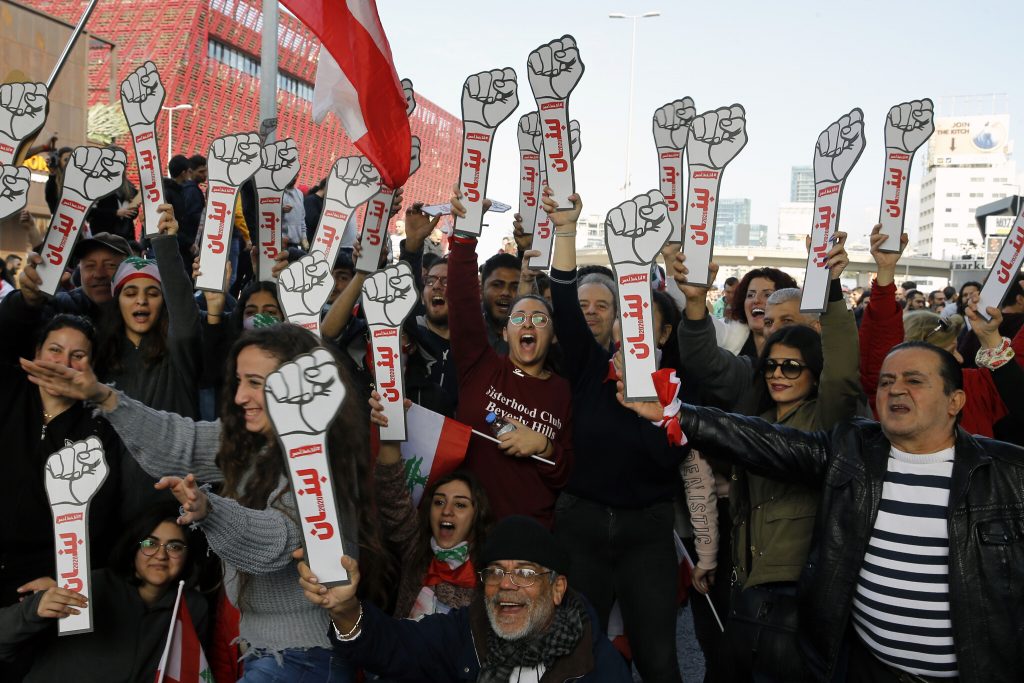
Amidst obstacles to the creation of a new administration in Lebanon angry protesters have begun returning to streets. Protesters are returning with the slogan, “The revolution is coming back.”
There were clashes between the protesters and army and security forces. Protesters burned tires, blocked roads and brought traffic in Beirut to a standstill on Tuesday in renewed demonstrations against economic hardship and government corruption.
The protests turned smaller over the last few weeks as the movement’s momentum slowed down.
The country is facing its worst economic crisis in decades, with the local currency plummeting against the US dollar
Protesters from Beirut’s southern suburbs joined a demonstration outside the Central Bank, chanting against the governor and his policies of restricting dollar transactions and deposit withdrawals.
Others gathered outside the Beirut home of the newly designated Prime Minister, Hassan Diab, calling for his resignation less than a month after he was appointed.
In Tripoli, protesters clashed with army and internal security forces. An officer was hit in the head by a stone, and a protester was hit by a rubber bullet.
The demonstrations, which began in October and led swiftly to the resignation of Saad Hariri as prime minister, had been scaled back in recent weeks amid negotiations to form a new government.
But protesters returned to the streets on Tuesday to complain about unemployment and financial meltdown, as the Lebanese lira plunged in value to 2,500 against the US dollar, compared with the official exchange rate of 1,515.
Students also took part in some of the protests and hundreds marched down main highways, raising Lebanese flags and blasting rallying songs through loudspeakers.
In central Beirut, dozens rallied outside the central bank, chanting against the governor and his financial policies.
“We gave them a month to form a new government, so they thought we were weak and they went back to their corruption,” said one woman standing on the Ring Bridge with protesters waving Lebanese flags.
“They proved that they do not care about the people or the economic collapse that the country is experiencing, so we decided to return to the streets.”
Another activist said: “We want a government that will save the country from the abyss it has fallen into.” One woman from Tripoli complained: “I do not work, my children are unemployed, and politicians do not care.”
A rudderless country
Politicians have been unable to agree on a new government since Hariri resigned as prime minister in October, prompted by protests against state corruption and bad governance. This has left the country rudderless and with no rescue plan as the financial and economic situation worsens.
President Michel Aoun said obstacles remained to the creation of a new administration.
“Although we do not have the luxury of delay, the formation of this government requires the selection of qualified candidates, worthy of the confidence of both the people and the Parliament, which in turn requires time,” he said.
Must cooperate with IMF and World Bank, says Hariri
Lebanon must cooperate with the International Monetary Fund and World Bank over its economy, which is in deep crisis, but that should be overseen by a new government and not the current caretaker cabinet, Prime Minister Saad al-Hariri said on Tuesday.
Asked if the caretaker administration should act on the economic crisis, Hariri said: “We all know that any step we want to carry out in the economic file needs us to cooperate with the World Bank, the IMF and other international institutions.”
“Let’s suppose that I spoke to the World Bank and we agreed with them on something, can I implement this agreement as part of a caretaker government. No, it is not possible,” he said.
Only a government operating normally with the confidence of parliament could enact such an agreement, Hariri said in comments reported by Lebanon’s National News Agency.
“The basis of the solution is to form a new government and not refloating a government that resigned at the request of the street,” Hariri said.
Last month, the powerful Lebanese group Hezbollah and its political allies nominated Hassan Diab, a little-known former government minister, to form the new government. But talks aimed at agreeing on the cabinet are mired in complications.
SIGN UP FOR COUNTERCURRENTS DAILY NEWS LETTER









































